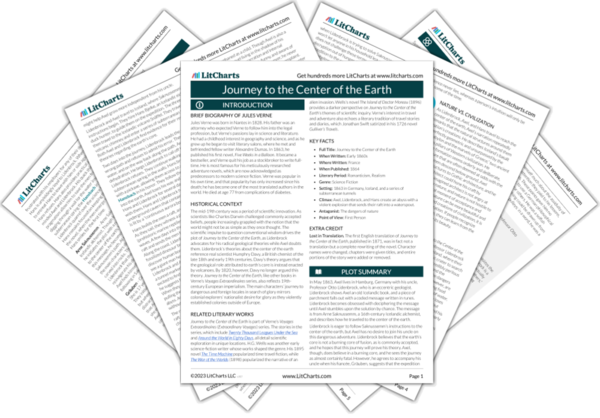Professor Lidenbrock is renowned for his intelligence by both the academic community and his own nephew. Axel repeatedly refers to Lidenbrock as a “savant,” a term he uses to explain the professor’s eccentricities and dedication to knowledge. Lidenbrock and Axel are scientists, and both of them value the scientific principle of measuring a hypothesis against concrete evidence. When they argue with each other, each man only discusses facts that he can prove, structuring each argument like a scientific debate. Their most significant disagreement centers on whether geological evidence agrees with Lidenbrock’s theory that the earth’s center is not a burning core of fusion, and both men seek evidence to support or disprove this theory throughout the novel. Importantly, they’re both able to find concrete evidence that supports their favored theory, or what they intuitively believe.
Journey to the Center of the Earth suggests that this process of finding scientific evidence is crucial, because following one’s intuition without any evidence to support it is unwise and can be downright dangerous. It’s noteworthy that Lidenbrock is only ever proven incorrect when he prioritizes his instinct over the evidence in front of him, such as when he randomly chooses the direction to take at a fork in path, leading the expedition down a dead end that wastes days’ worth of water. These moments of failure prove that even a savant is not infallible: the evidence never lies, whereas a person’s intuition will only be right some of the time.
Intuition vs. Evidence ThemeTracker

Intuition vs. Evidence Quotes in Journey to the Center of the Earth
“[…] other distinguished geologists agree with [Poisson] in thinking that the interior of the globe is neither formed of gas nor water, nor of the heaviest minerals known, for in that case the earth’s gravity would be twice less.”
“Oh, figures can be made to prove anything!”
“And facts, too, my boy. Is it not unquestionable that the number of volcanoes has considerably decreased since the early days of the world, and if great central heat existed, would it be likely to get less powerful?”
“If you enter the field of suppositions, uncle, I have nothing more to say on the subject.”
“This is what I settle,” replied Professor Lidenbrock, mounting the high horse; “that neither you, nor anyone else, knows anything certain that is going on in the center of the earth, seeing that we scarcely know the 12,000th part of its radius, that science is eminently perfectible, and that each theory has constantly to give way to a fresh one.”
Had I been listening to the mad speculations of a fool, or the scientific deductions of a great genius? And in it all, where did the truth end and error begin?
A thousand contradictory hypotheses floated before my mind, and there was nothing I could lay hold of.
“When science has spoken, it is for us to hold our peace.”
I went back to the parsonage, very crestfallen. My uncle had vanquished me by scientific arguments.
As a true nephew of Professor Lidenbrock, and notwithstanding my mental preoccupation, I was interested in observing the mineralogical curiosities displayed in this vast cabinet of natural history, and, at the same time, was going over in my mind the whole geological history of Iceland.
“[…] if there is any law of increase in temperature, the heat here ought to be 1,500.”
“Ought to be, my boy.”
“And all this granite would be in a state of fusion, as it could not possibly remain in a solid state.”
“You see, however, that it is nothing of the sort, and that facts, as usual, give the lie to theories.”
What another had done I would dare, and nothing to me seemed impossible.
“While the heart beats and the flesh palpitates, a creature endowed with will should never give place to despair.”











